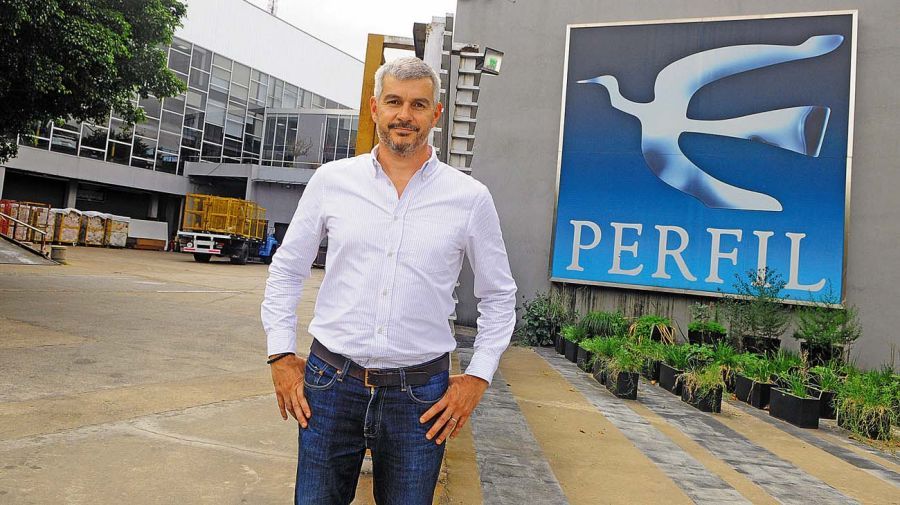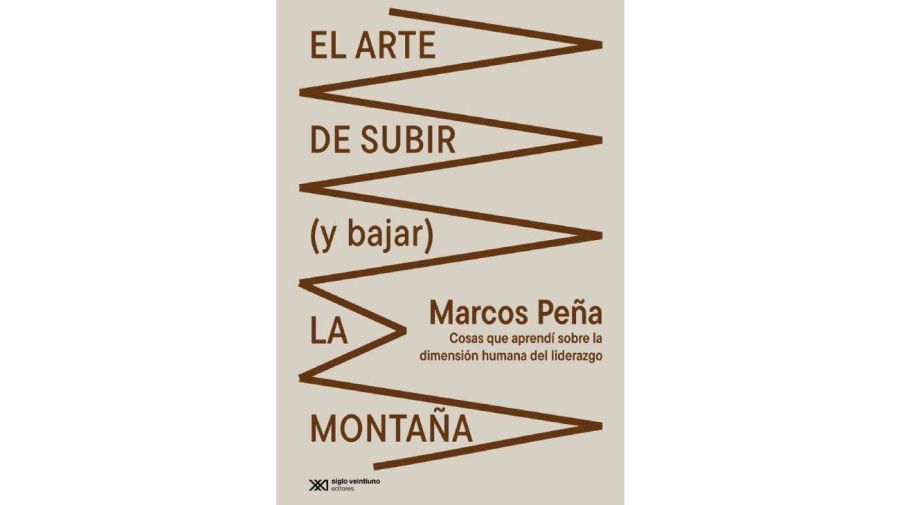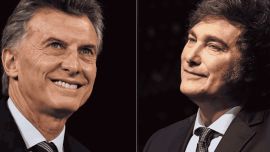After an absence of four years from public life, Marcos Peña has returned in a reflexive mood and with a tone apart from the aggressive communicational dynamics of current politics worldwide, fed heartily by social networks.
Peña, 47, the former Cabinet chief of the Cambiemos government and Mauricio Macri’s campaign chief in the 2015 elections, has explored diverse psychological therapies of self-knowledge since leaving public office, finding a path to healing with a profound analysis of his experience in power.
He dedicated himself to interviewing leaders of different disciplines for his new book, El arte de subir y bajar la montaña (“The art of climbing and coming down the mountain”) in his desire to leave a footprint for more compassionate and humane leaderships.
In your book, you speak of a compassionate and more humane leadership as a model of what leaders should be. Do you find that some current political leaders, and I’m not just referring to [Javier] Milei, but also [Donald] Trump and [Jair] Bolsonaro, who are or have been successful, happen to be cruel and are the opposite of that compassionate leadership?
Two things here, I think, on the one hand there is a parallel level which has to do with the authenticity which many leaders manage to transmit in my opinion – not always the truth but the authenticity and conviction about which the Hungarian psychiatrist Gabor Maté talks a lot, describing leaderships produced by child abuse situations. He talks a lot about Trump and the construction of a mechanism to describe reality which is 100 percent true for them but maybe not [the truth]. Yet others might find it authentic and I believe that many of these leaders connect via anger and resentment but also that authenticity. On the other hand, there is a huge problem with technocratic, cold and bureaucratic leaderships because when I speak of compassionate leadership, I generally don’t find much in today’s politics as a central characteristic.
Doesn’t that have to do with technological change and social networks boosting that coldness?
It certainly boosts transparency. Power was designed for hidden and dehumanised rituals. Kings, emperors and chieftains were always protected, hardly visible and very vertical and institutions were designed on that model, as were such buildings as the Casa Rosada or the White House. And suddenly the social networks, Internet and mobile telephones lead to a 24/7 transparency so there is a super-complicated disengagement.
So everything becomes hyperreal rather than real.
Hyper-transparent, I’d say, but – and here I’m partly looking at myself – the exercise of power often obliges you, if you’re not prepared or accompanied or aided, to shut yourself up in defensive mechanisms because you are in conflict, you’re distributing power, you’re all the time in a tense scenario which somehow continues the wars with swords and daggers but today with words. And five minutes after being in that situation, they stick a mobile telephone in front of you and tell you: ‘Now be nice, transparent and empathetic,’ and we’re not designed for that. So many use that to construct a false image, quite deliberately sometimes, which is worse because the problem is more noticed when artificial.
I remember in other interviews with you how you outlined a Darwinian evolution where Cambiemos was at the cusp of that process which had begun with a centre-right party evolving into a centrist party, with the need to incorporate the Radicals and Coalición Cívica, seen from your perspective as a virtuous path. Today we see ideas shifting to the right. If it was virtuous before, isn’t there some virtue in adapting to the mood of the times at every point?
I believe for a start that the context is changing fast and that is not a minor point. When we took office in the City of Buenos Aires, which seems like yesterday, there were no iPhones and nor had Trump, Bolsonaro and those other new phenomena of the right governed with all the expectations and frustrations which they generated at times. I think that the intentions of many leaders might be similar at heart but the situations can differ. In my opinion those who wanted a more ideological party from the start always wanted one and from that point they went gaining more volume, or not. I don’t believe that there’s so much design about it.
It just happens.
It just happens, yes.
But that is not an involution.
Not necessarily. I do not believe it to be linear in that sense. I take your point and understand the concern, which is shared by many people who participated in Cambiemos and PRO. For me the involution [of PRO] comes from giving less value to identity and for that to happen, I believe that sometimes pragmatism...
...or accommodation to the mood of the times.
Yes, but sometimes not so much the voters as the system which carries you away. And there are many politicians, not just ex-Cambiemos or former or current PRO. You need to ask yourself a bit whom you represent today, why you do what you do, what you want to transmit, what you want to do, even what conflicts you are ready to take on.
Historically PRO was always based more on its vocation to transform rather than any ideology. We put up with [negative] situations, sometimes excessively, in order to transform the status quo, we dared to argue. Sometimes it turned out better and sometimes worse but I don’t know if all that is so clear today. And I’ve spoken to many people about that, the context is not easy, I’ll come back on that point but I believe it to be a challenge lying ahead.
How did it affect you to see the coalition which won the 2021 midterms finishing third two years later?
It saddened me very much because I believe the human capital in Juntos por el Cambio to be of great value, even if they are all scattered now. That is one of the great assets of the construction of those years. I really believe that the disconnection with the people which cost votes is in part a lost opportunity.
“Historically PRO was always based more on its vocation to transform rather than any ideology.”
How did you experience the primary between Horacio Rodríguez Larreta and Patricia Bullrich?
Firstly, understanding that it was the consequence of a process including – in part due to the pandemic, I believe – that lack of any shared reflections in 2020 to synthesise a common balance of our government. Many people told me that Zoom was a major problem since the main protagonists could not sit down and eat for five hours while chatting things over, ‘I have this vision,’ or ‘This is mine,’ but finding a common synthesis and, as I always saw it in my experience, our teamwork was what people valued most, besides our intention.
So I think that the difficulty of the democratic renewal of leadership in a primary is the inability to respect the balance and look after the collective. That is very difficult but it made me very sad to see the ever-deeper personal spats between people who had worked very well together and with whom I had already co-existed. I still believe that there is plenty of value there.
Do you think that this can be ‘cured,’ a word you have used?
Anything can be cured, I believe without a doubt. I believe that in Argentina there are few or no relationships standing above the political and human vocation to sit down with those who are different and try to seek points in common. And paradoxically, this is in part a desperate cry not to close down the differences but to recognise the basic humanity of others.
Not named until now but omnipresent is La Libertad Avanza, along with the question of whether PRO as it now stands will disappear like Juntos por el Cambio. Coalición Cívica and an important faction of the Radicals have broken away while La Libertad Avanza looms as a possible potential ally to construct another form of coalition, not of the centre but of the right. What is your own opinion of the role of La Libertad Avanza?
That is linked to the previous question. I have no access to nor am I looking at studies etc., but I do not believe the La Libertad Avanza vote to be an ideological issue, far from it. I believe it to be much more a phenomenon of these times and that the anarcho-liberalism reflects a younger generation, children of that digital revolution who cannot see those symbolic categories ordering the world until now as being so relevant. The state, the welfare state and even democracy itself is very different for somebody of 20 than for somebody of 60 or 70. So I thus believe the generation gap to be more complex. Mauricio [Macri] has said: “Let’s follow our youth, who are the ones showing the way.” One hypothesis, I believe, is that the PRO representation aged at some point, reflecting today, for better or for worse, that agenda of order in the face of chaos.
One of the questions posed to Jaime Durán Barba in the 2019 campaign was why older people were voting for PRO, while younger people were voting for Peronism. He replied: “Because older people know better with more experience, they know what’s good.” Are we in a change of epoch in reverse where the children are teaching their parents?
Quoting what Mauricio says, part of the reasoning behind what is happening today is almost a risk because how do you make an intergenerational alliance when one generation wants order and the other chaos, to simplify the point?
The challenge is huge and happening everywhere. So within this issue of left, right and centre, there are layers and if you look at the generational layers, it all means something very different.
“I do not believe the La Libertad Avanza vote to be an ideological issue, far from it. I believe it to be much more a phenomenon of these times.”
Some aesthetic questions, for example, should not be put in terms of right and left but rather the neat and tidy versus the freaks. PRO and Cambiemos show off their good manners while La Libertad Avanza clearly show off their bad.
That might be a definition which leads to a readjustment, I don’t know. I don’t know where they’re heading. The only thing I would say in this context is that political parties as a concept today are increasingly drained of representation, so I believe that such discussions are often discussions between leaders which do not necessarily align with representation.
You have these two paths, PRO or the old Cambiemos, so to speak – we dare to compete with our form of moving in the direction of having some things in common or else heading all together to where the Zeitgeist seems to be taking. That is a decision which they will have to take and it will be seen which way the voter goes.
I do believe that a very big percentage of voters will continue to want something similar to what Cambiemos used to be. But I also believe that this big percentage of voters is not seeing anything today which seduces and mobilises them, you still have a year to get there. I would place more focus today on those sectors which want something different, taking the trouble to put something together to motivate them. If they only criticise and obstruct or observe, I think that will have negative feedback like what happened to Kirchnerism.
If I interpret you correctly, would it be an error for PRO to ally or merge with La Libertad Avanza and what would it need to do to try and recreate a coalition like Cambiemos with centrist, centre-left or progressive forces with whatever name they would want to give it but which spells “peace”?
No, I didn’t say that. I’m not judging and I don’t want to put myself in the place where I’m saying what is and isn’t an error, I’m just saying that this is the decision which they are facing.

What would be the best decision for you?
It depends on what they want. I believe that there is a super-important issue of what they want, whom they want to represent, what they want to do, what they want to build in future and on that basis they will construct adhesion. If they want to be represented under Milei’s leadership, for those who believe in that, it’s perfect. What you must not do is to remain barefoot from who you are and what you want. That’s the only thing I would say because that would be a lack of authenticity.
Within that representation, the forms are as important as the values, for example, respecting violence, a certain perspective of the past, the civilised treatment [of people] … for Juntos por el Cambio the press was very valuable as a fundamental instrument for maintaining the separation of powers during Kirchnerism and guaranteeing democracy. For you it was a value to tolerate even the press which criticised you. On the contrary, like with Trump or Bolsonaro, for the Javier Milei government the press is an enemy for daily battles with all journalists and all media. Are values of that kind no longer so important?
As far as the leaders go, I think there is no doubt, such is their conduct. As for the voters, I think Milei has a winning discourse giving him a legitimation which has been expressed by some of our historic Juntos por el Cambio voters, a saturation with a status quo which, as they understand it, is responsible for the lack of solutions. I think it is difficult to argue with that by saying: ‘Well now, you got here somehow.’ If we in 2016 had begun to attack the press like this, I think many people could have said: ‘You have broken with your electoral contract and your identity.’ In this case it’s weird because they have attacked from the start, that’s the challenge.
I imagine that distance permits you to reflect beyond the cycle. How do you imagine the future political map of Argentina, divided into two as habitually, into three or even a fragmentation more like Germany?
I find that still hard to see because I think there has been such a great shock that everybody remains paralysed, as happens when something disruptive comes along. I think that the deep majorities will seek to be generally moderate, and you’re seeing plenty of that at the municipal and provincial level and in politics in general, but it must also remain clear that much of that has become dissociated from the people in some cases. So I think that what’s missing – and that’s the spirit of this book a bit – or at least in my case as somebody having had the responsibilities I had, to splash out speaking of myself and saying: “This is what I learned, this is what I would correct.”
I feel that the powers that be in Argentina, not just the politicians, are falling short in adding the analysis of the counterweights which each should provide, an also introspective look in order to say what we must do differently to have different results because the aggregate is not working out. How we face that or how far we have to go with divisions and disputes in order to carry out that process, I do not know. I remember back in 2002, many people saying that the time had come for everybody to lower their banners and say: 'I’ll give a little,' and it did not happen. I’ve had some contact with African politicians nowadays and I’ve seen plenty of examples of downward slopes having no limits. There’s no reason to think we’ve hit bottom.

Is Milei part of the end of an era and the result of the annoyance of the present with the past or, on the contrary, the emerging figure of a new society who represents the beginning of another epoch and not part of the end of the previous one?
That depends on the rest. You often need to break away from that metaphor of the centrality of the President and take a look at the whole picture a bit. If you take 100 people, they are not 100 people because the weight of each person depends on what the other 99 do. The system balances or not according to those 99. The world of power in Argentina keeps working to remain occult, in general, you can see that from the media. The strategy of the business, labour, academic, intellectual and religious worlds is generally to keep their heads down. And your second point is negotiation with the state where I try not to get annoyed so that the powerful do not get annoyed with me because that is the usual dynamics here and I think that those dynamics are triggering such an immense fatigue in society that they are saying: ‘No more,’ with a desire to return to better times of which there is no register. But people are saying: ‘Let’s not go back because we weren’t better off.’ This idea of continuing to break things up until somebody realises could be self-reinforcing.
Change does not necessarily have to be for the better, it could be for the worse.
Maybe but at the same time if we take note of that and each one of us tries to make a contribution saying: ‘How can we construct something better than what went before?’, the political future of Argentina and our own future is perfectly open. And I also believe that if we part company with that very frustrating idea that we are permanently a failure and that everything is a disaster, making a Zoom out to the world, [we will find that] Argentina is neither the best nor the worst, it has a whole bunch of valuable things but a bit more love for this land is sometimes missing in the leadership.
“The exercise of power often obliges you, if you’re not prepared or accompanied or aided, to shut yourself up in defensive mechanisms because you are in conflict.”
Would you have imagined Milei becoming President two years ago?
You have to hand it to Jaime [Durán Barba], he loves it when his vision of the future is recognised because two years ago he was saying that this was going to happen. I had more faith in Juntos por el Cambio, believing that they would be able to occupy that position. As time went by, I started understanding that it could happen but I believe that it was a match lost by our team rather than just won by him [Milei].
Milei speaks of a cultural battle. Is it possible to change the culture of a society in a single presidential term?
I find it hard to believe that, in our country, where we are very anarchistic, horizontal and fragmented, that the state should have so much influence nowadays. That was a discussion with many businessmen during our government, they were saying: ‘There must be a cultural change towards capitalism in Argentina.’ In what country did a democratic Western state make that economic cultural change? And you, what are you doing? We cannot always be thinking that there is only one protagonist in Argentina. So today I would say much the same, I feel that the energy which many put into these symbolic fights on one side and the other is wasted energy.
Production: Melody Acosta Rizza & Sol Bacigalupo.


















Comments